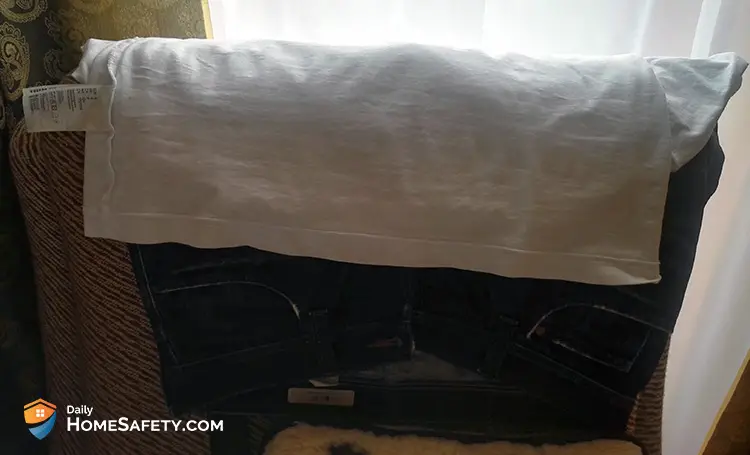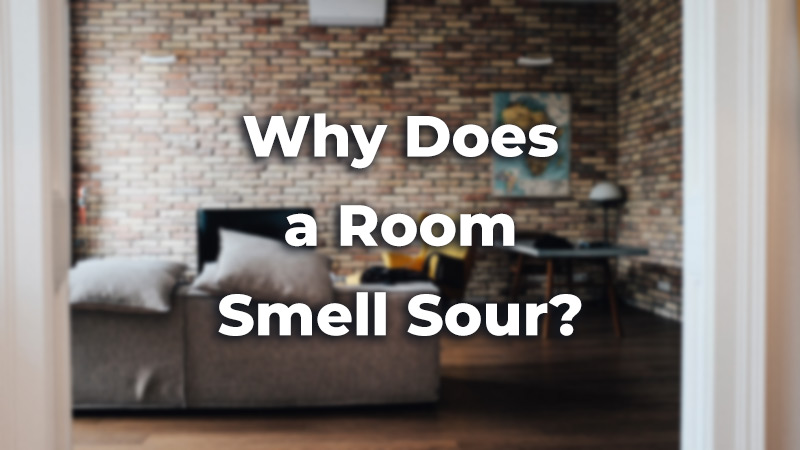There could be many reasons why a room smells sour and the best way to find the root cause and get rid of the unpleasant odor is to take a strategic approach.
What do I mean by that?
Instead of randomly checking and replacing or cleaning stuff in your room, you’ll have a much better chance of success if you first determine some important qualities of the odor. I’ll come back to this soon.
Your room can smell sour for many reasons, including dirty clothes, mold spores, pet urine, sweat, moisture, mildew behind a piece of furniture, insufficient ventilation, or a dirty trash can. Things that smell sour are acidic (resemble vinegar) and the foul odor is often caused by bacteria.
First Step: Understanding Why Your Room Smells Sour
Now let’s get back to the strategic approach I mentioned earlier. Below you’ll find some useful questions which, if answered, will make it much easier for you to identify the source of the odor.
Does the entire house (or apartment) smell or just a specific room?
Close the door of your room for a few hours and air out both the room and the rest of the house. Leave the building for 15-30 minutes to avoid olfactory fatigue. This phenomenon occurs when you are exposed to an odor for a prolonged time and your olfactory cells get accustomed to it thus you can no longer smell the odor.
If the source of the sour odor is in the room, you shouldn’t really smell it when you go back home until you enter the room.
If the intensity of the smell is the same in the room and the rest of the house, chances are good that the root cause is not in the room. However, if the smell is much stronger in the room then you only have to focus on that area.
Identify the area of the room where the smell is the strongest!
Now it’s time to find the area (or areas) where the smell is most intense. Divide the room into four equal parts and use your nose to find the most smelly area. After a few minutes go outside to breathe some fresh air to prevent olfactory adaptation.
For how long has the room been smelling sour?
Determining the duration of the smell is an important step that will help you rule out some of the possible causes. For instance, if the odor has been around for weeks, the source is likely permanently present in your room, so you can ignore the trash can, for example (but only if you empty and clean it regularly).
Does the intensity of the odor change during the day?
If the intensity varies significantly, it may have to do with your habits, the temperature, or other variables. For instance, if you’re dealing with pet urine, usually the higher the temperature, the more intense the odor.
If the intensity keeps fading, the cause might be a one-off event that does not recur (some spilled yogurt, for instance).
Is the sour smell present all the time or does it sometimes go away temporarily?
If the smell disappears from time to time, chances are good that you’re dealing with a recurring cause. An example would be dirty and sweaty clothes in your room.
Does ventilation solve the problem?
If airing out your room thoroughly resolves the issue, the source of the odor is probably outside of the room (check the yard and other parts of your home).
And now let’s see the most common causes of a room smelling sour.
1. Dirty Laundry In the Room

This is probably the number one reason why a room smells sour. This is especially true in summer when most people sweat a lot (sweat often smells sour).
All it takes is one dirty T-shirt left in your room to give off unpleasant odors.
So if you leave your dirty clothes in your room instead of putting them into the laundry basket, just go and collect them. Then after a few hours check whether the odor has gone.
Don’t just think of the clothes you wear. Make sure you also check your bed linen, the couch, chairs, and everything else that you regularly use and might get in touch with sweat.
2. Pet Urine
Pet urine is another common thing that can be responsible for unpleasant odors. Practically any pet that you keep free in your room may pee on the carpet or in one of the corners of the room (including the wall).
Puppies that are not yet used to their new home are especially prone to urinate in the room. So if you’ve just got a new pet and bad odors appear, always consider urine as the main cause.
Urine is not the only thing that can smell sour, however. For instance, cats sometimes throw up and if it remains unnoticed, unpleasant odors will eventually fill the room.
Sometimes the pet itself emits a foul smell. Pet odor is pretty characteristic and typical of the species. In certain cases, bad pet hygiene is responsible for the odor.
3. Odor That Comes From the Trash Can
If there’s a trash can in your room, it can be a source of all kinds of smells and scents depending on what’s inside.
Typically, sour smells originate from certain kinds of foods that you leave in the trash can for days (or weeks).
However, not all food that starts decomposing or rotting will cause a sour smell in the room. Although rotten eggs smell really awful, it’s nothing like sweat. On the other hand, vinegar, mustard, or pickles smell sour, especially if you leave them at room temperature.
Emptying your garbage can should be one of your first steps if your room stinks.
4. Carpet
When I was younger, I lived in an apartment for a few months and I had the same problem as you now. Back then it took me a few hours to realize that it was the carpet pad that emitted the sour smell. I still have no idea the reason but once I got rid of it, the odor went away permanently.
Long story short, always check the carpet, even if you clean it regularly and don’t have any pets. All sorts of things can build up in the fabric, and some of them might give off unpleasant smells.
For instance, a little drop of a dairy product, such as yogurt, on the carpet (if it stays there for days) is more than enough to make your room smelly. But I could mention a bunch of other odorous things that can be easily absorbed into the carpet.
Tip: In most cases, clean water is not enough to make the stain disappear. Make sure you use a carpet cleaner or a detergent that’s appropriate for your carpet.
5. Furniture, Cabinets, Windows, and Doors
Furniture can emit all kinds of odors depending on the materials that are used during manufacturing. For instance, new wood products often contain higher levels of formaldehyde that have a pretty characteristic strong chemical odor.
You should definitely have a look at the furniture and cabinets if they have been exposed to water (or moisture) or high temperature (for instance, if the sun hits it in the summer) recently.
Don’t forget to check the inside too (including your clothes and other stuff). Sometimes you can find traces of mold that give off a musty smell.
Make sure you don’t miss the bed either, including the duvets, sheets, and pillowcases.
Windows and doors can also smell sour in certain cases. For instance, if a cat or a dog pees on the window from the outside, the sour odor can get into the room during ventilation. Also, sometimes the paint on the frame can emit a unique smell.
6. Smell Caused By Mold and Moisture
Where moisture is persistent, mold will appear sooner or later. This can have a number of unpleasant consequences, including a musty odor.
The most common cause of mold growth is constant high humidity in the room.
Sometimes the source of the moisture is a leaky pipe in the wall but that’s not the most common scenario.
In case of high humidity, condensation occurs in certain places, initially behind furniture. That will help mold to form and spread.
Often the source of the bad smell is mold behind the wall carpet. Thus, if humidity is a concern in your case, make sure you check the wall carpet as well.
7. Food In the Room & Smoking
Although this one is pretty obvious, I included it on the list because if you regularly eat in your room, different smells can mix and don’t necessarily fade away immediately after finishing the meal.
It’s particularly vinegar-based, pickled, fermented, and acidic foods that will have a sour smell.
If food is the cause of the smell, in most cases it should go away permanently after thorough ventilation.
After cooking certain meals, smells might penetrate through clothes and other textiles, such as curtains or drapes. In those cases, the odor might need more time to disappear.
Don’t forget about pet food either. If your pet doesn’t eat all the food that you give them, the rest will spoil at room temperature sooner or later.
Often, the culprit is smoking (or smoking mixing with other smells). Unfortunately, besides smoking outside your room and increasing air exchange, there’s not much you can do about it.
8. Sour Odor Caused By the Sewer System
A malfunctioning sewer system can cause a lot of annoyance. One of these is an unpleasantly pungent odor in certain areas of the house. In case you need some helpful tips, here’s a useful article on sump pump maintenance.
Sewer gas smell can be the result of unused sinks, bacterial overgrowth in the drains, and sometimes a leaky pipe. In the latter case, no air freshener will help and you’ll need to ask for expert help as soon as possible.
In many cases, drains can be successfully cleaned with a combination of baking soda and white vinegar, however, sometimes you’ll need mechanical cleaning as well. Here’s a more detailed guide.
Garbage disposal often emits similar odors, so you might want to check if there’s one close to your room.
While plants in the room can improve air quality, standing water in the pot saucers can be really smelly after some time. Check them regularly!
9. Smell Coming From the Crawl Space

If you can’t find the cause of the sour smell in the room and it’s located above or close to the crawl space (or basement), it’s a good idea to check that place too.
Sometimes the source of the smell is not in the room but in the crawl space.
Numerous things can smell sour in the crawl space. Think of mold, standing water, dead animals (mainly mice and birds), decaying materials, etc. The smell then seeps up into the room.
In most cases when the problem is in the crawl space, the smell is present in the whole house and not just in your room.
10. Ventilation Issues
A low air exchange rate and stagnant air can also lead to the build-up of sour odors in your room. Regular ventilation is important for several reasons, and avoiding unpleasant smells is only one of them.
It’s a good idea to check whether the sour odor comes from the air conditioner. There are several reasons why an air conditioner stinks, including:
- draining problems (standing water),
- gas leak,
- a dead animal in the duct,
- engine issues
If you conclude that there’s a problem with your air conditioner, I suggest that you ask for help from a professional instead of trying to DIY.
11. It’s You or Another Person
It might be inconvenient to realize but sometimes the source of the sour smell in the room is you or another person.
While we all have sweat glands, not everyone produces the exact same amount of chemicals. Some people have more of the type of sweat glands that produce sour-smelling sweat and excessive body odor.
The person affected often doesn’t even realize the fact that they are the source of the odor because “it’s always with them”, so their olfactory cells have got used to it.
The solution is usually simple: good personal hygiene.
Wrapping It All Up
When a room smells sour, there are multiple things you should check as the potential causes are numerous.
Sometimes the reason is quite obvious, however, I’ve already seen some really tough cases (mouse urine inside a personal computer).
The good news is that most cases can be resolved pretty quickly and easily, but you often have to put in the work.
Although an air purifier or air freshener can help a lot, in the long run, you will be better off solving the root cause of the problem.
Photo credit: Flickr (Alpha)











